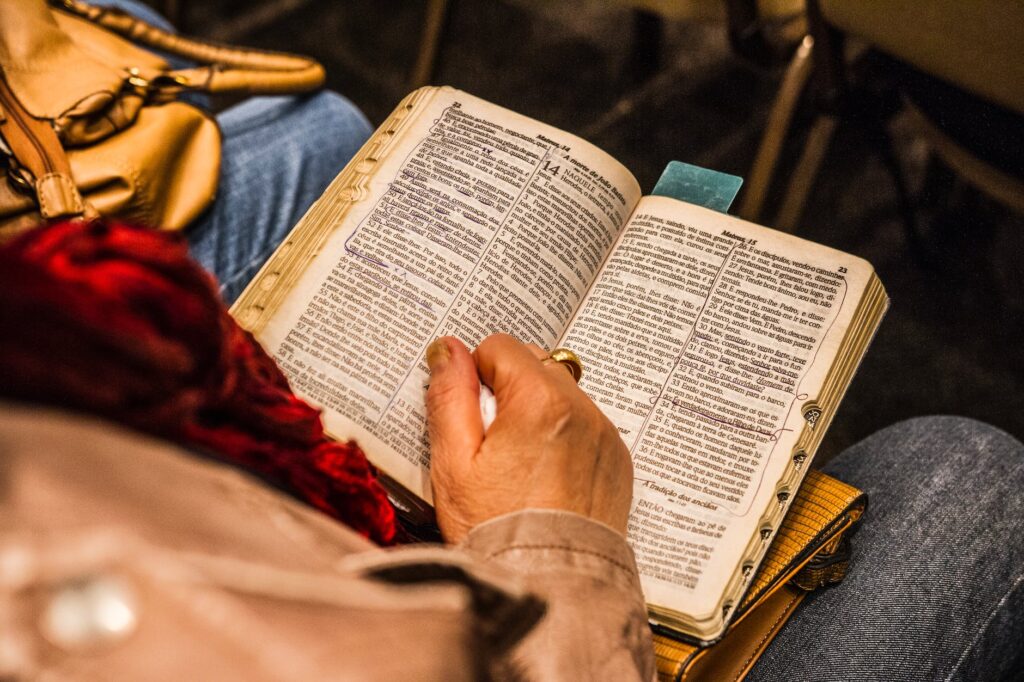What is the Will of God?
Anyone who has taken an introductory course in Logic knows that the ambiguous use of words or terms is one of the most potent hindrances to communication. Since a single word can mean multiple things, two people can speak past themselves when one is using the word in a way different from the other.
For example, the statement “Brian goes to the bank every day” can mean that Brian goes to the river shore every day or that he visits a financial institution every day.[1] If A is using the word in the former way, B, who is using it in the latter sense, can disagree with A. The disagreement can become indeterminable without that clarity about the use of words.
In Christian circles, one term that has often suffered from ambiguity is “the will of God.” The nature and consequence of this ambiguity were again emphasised when some Nigerians were arguing whether the result of its last presidential election was the will of God or not. People also argue whether an ugly event – for example, the recent earthquakes in Turkey and Syria – is the will of God or not.
We have also encountered many believers who talk a lot about finding the will of God for their lives. Many will put significant decisions on hold until they are assured that whatever step they take is the definite will of God.
The problem in all of these instances is the ambiguous use of the term – the will of God. In what follows, I will consider the variety evident in the biblical usage of this term and how an understanding of these varieties can clear our confusion and improve our Christian lives.
Variety of usage
According to Kevin DeYoung, a pastor and theologian, there are three ways we often use the term: God’s will of decree, God’s will of desire, and God’s will of direction.
The first “refers to what God has ordained,” the second to “what God has commanded,” and the third to his “individual, specific plan for the who, what, where, when, and how of our lives.”[2]
However, Kevin is quick to insist that only “two of these ways are clearly demonstrated in Scripture” with the third (God’s will of direction) being a “little more complicated” (more on that later).
Melvin Tinder, a theologian, also identified these three uses with different terminologies. First, there is God’s sovereign will “in which he is in total control over all things according to his eternal decree and power; this cannot be thwarted.” Second, there is God’s moral will which “concerns matters of right and wrong which he has revealed to us in the Bible and which we are called to obey.” Third, there is God’s individual will, by which we mean “his personal purpose” for our lives.[3]
Like Kevin, Melvin saw a distinction between the first two usages and the third. He prefaced his description of the first two with “there is the sovereign (moral) will of God” and the third with “Eve in our story, and many Christians, speak of God’s individual will.”
J.I Packer, the famous Anglican theologian also identified two ways of using the “will of God”: the “hidden will of event” and “the will of precept” or “revealed will.”[4]
In addition to these two usages, D.A. Carson, a theologian, also talks about the usage of God’s will to describe his disposition. “God is sometimes presented as the one who seeks men out, loves a lost world, declares his yearning for their repentance, and the like.”[5]
Now that we have done this brief survey, let’s consider each of these usages in turn.

God’s sovereign will
God’s sovereign will is also known as his will of command or his decrees. Scriptures over and over again insist that whatever God wills he does and no one can stand against him. This is why this will is delineated as “sovereign.”
We can begin to see this in Ephesians 1:11 where God is described as the one who “works all things according to the counsel of his will.” Here, the will of God is what he has decreed or predestined and which he will bring to pass.
According to the Psalmist, “Our God is in the heavens; he does all that he pleases” (Psalms 115:3). Again, the will of God is sovereign – he does everything that he pleases. No one’s words can come to reality except God has commanded it (Lamentations 3:37) and even though humans make plans, it is God that determines what finally happens (Proverbs 16:9).
Furthermore, God’s sovereignty is comprehensive. He is the one who deposes and raises up kings (Daniel 2:21, 4:25); he is the one who forms light and creates darkness; well-being and calamity (Isaiah 45:7); good and bad come from him (Lamentations 3:38); the death of sparrows is under his sovereign will (Matthew 10:29); he kills and brings to life, makes poor and makes rich, brings low and exalts (1 Samuel 2:6-7); and the decisions of lots (similar to a dice) are from him (Proverbs 16:33).
According to A.W Pink, “the hundreds of prophecies which are found in the Old and New Testaments are not so much predictions of what will come to pass, as they are revelations to us of what God has purposed shall come to pass.” Carson agrees, “Yahweh’s predictions concerning what will take place in the future, and his control over that future, cannot always be decisively distinguished (cf. Gen. 15:13-16; 25:22f.; 41:16,25,32; Josh. 6:26 and 1 Kgs. 16:34; Isa. 46:8-10; 48:5f.). What he decrees must come to pass.”[6]
The Westminster Confession of Faith (WCF) explains it thus: “God, from all eternity, did, by the most wise and holy counsel of His own will, freely, and unchangeably ordain whatsoever comes to pass: yet so, as thereby neither is God the author of sin, nor is violence offered to the will of the creatures; nor is the liberty or contingency of second causes taken away, but rather established.”[7]
In essence, everything that happens is the will of God. In this sense, then, it is right to say that the tragedies that happened in Turkey and Syria were the will of God.
Yet, the WCF instructs us that God’s control over everything that happens does not eliminate human responsibility or secondary causes, and neither does it make God the author of sin.
Regarding the first point, orthodox theologians have maintained a philosophical doctrine called compatibilism. Carson defines it thus:
- God is absolutely sovereign, but his sovereignty never functions in such a way that human responsibility is curtailed, minimized, or mitigated.
- Human beings are morally responsible creatures – they significantly choose, rebel, obey, believe, defy, make decisions, and so forth, and they are rightly held accountable for such actions; but this characteristic never functions so as to make God absolutely contingent.[8]
We see compatibilism in at least three instances. First, Joseph could say in the same breath that his brothers intended evil for him but that in the same action, God intended good (Genesis 50:19-20). His brothers acted (sinned) freely – human responsibility – but God was sovereign – he decreed the event for Joseph’s (and Israel’s) good.
Second, Herod, Pilate, Jews, and Gentiles acted against Christ and crucified him but in that same act, God was accomplishing what he has decreed from eternity past – the salvation of the human race (Acts 4:27-28). All the perpetrators were guilty of sin – human responsibility – but God was sovereign – Christ died according to his foreordained plan.
Third, Assyria acted out of pride and evil surmising when they attacked God’s people, yet in that same action God was disciplining his people (Isaiah 10:5-19). Assyria was guilty of arrogance – human responsibility – but God was sovereign – he ordained the event for the purification of his people.
Regarding secondary causes, we see that God often accomplishes his purposes through various means. As we saw above, he used Assyrians to punish Israel. God provides food for every creature (Psalms 145) but he does it through various natural processes.
Regarding the third point (God is not the author of sin), Carson notes that “God is never presented as an accomplice of evil, or as secretly malicious, or as standing behind evil in exactly the same way that he stands behind good.”[9] Again, “God stands behind evil in such a way that not even evil takes place outside the bounds of his sovereignty, yet the evil is not morally chargeable to him: it is always chargeable to secondary agents, to secondary causes. On the other hand, God stands behind good in such a way that it not only takes place within the bounds of his sovereignty, but it is always chargeable to him, and only derivatively to secondary agents.“[10]
We see Carson’s point from the texts we looked at when considering human responsibility. Joseph’s brothers, all the actors in Christ’s crucifixion, and Assyria did evil. God could have stopped them (since only what he wills to happen does happen) but he decreed that those evil plans of men will happen for the accomplishment of his own good purposes.
What about natural evil? We know that natural evils happen because of the fall of man (Genesis 3, Romans 8:18-25). Nature was corrupted because man was corrupted. Similarly, the holiness of God is manifested as the wrath of God when it confronts human sin (the cause and effect of the fall). So, we have various instances of God’s direct and indirect judgments against the sins of fallen humanity.
Yet, the fall (and the resulting sinful nature inherent in every man) would not have happened if God did not decree it for his own good purposes (for judgement and for salvation).
Said succinctly, while Scriptures attributes evils to secondary causes, it affirms that God decreed them for his own good purposes and that’s why they happen. This is Lamentations again: “Is it not from the mouth of the Most High that good and bad come” (Lamentations 3:37). This is God himself in Isaiah: “I form light and create darkness, I make well-being and create calamity, I am the LORD, who does all these things” (Isaiah 45:7).
We use the term “decree” rather than just “permit” to describe God’s relationship to evil because, as Carson puts it, “A sovereign and omniscient God who knows that, if he permits such and such an evil to occur it will surely occur, and then goes ahead and grants the permission, is surely decreeing the evil.”[11]
In this sense then, it is clear that no one can become a King or President outside of God’s decree. And no earthquake or flood can happen if he didn’t will it.

God’s moral will
God’s moral will refers to his moral commands and the norms he desires to govern his creatures.
We see this usage in 1 Thessalonians 4:13 where God’s will is our sanctification. A chapter later, we see that God’s will is that we rejoice, pray without ceasing, and give thanks in all circumstances.
In Ephesians 5:17, we are commanded to seek to know the moral will of God as the alternative to foolishness (Psalms and Proverbs see foolishness not as an intellectual deficiency but a moral one).
Doing God’s will is acting in ways that are pleasing in his sight (Hebrews 13:20-21), a fundamental characteristic of those who are partakers of the kingdom (Matthew 7:21).
The moral commands of God are to be found in Scriptures. For us in the new covenant, these consist of the command to love God and our neighbour (Matthew 22:34-40), the moral directives of Christ and his apostles, and the transcendent moral principles present in the Old Testament (see Ephesians 6:2 and 1 Timothy 5:18 for examples).[12]
We also know from Romans 2 that God’s moral law is written in the hearts of unbelievers who don’t have the Scriptures (Romans 2:12-16). Therefore, even non-Christians know God’s will to a large extent. “This aspect of God’s will is revealed in His Word as well as in our conscience, by which God has written His moral law upon our heart,” said Sproul.
In this sense, then, the sale of Joseph, the crucifixion of Christ, and Assyria’s treatment of Israelites were not the will of God. The point here is that something can be God’s sovereign will (everything that happens is) while it is not God’s moral will since God’s moral commands oppose it. As R.C Sproul puts it, “God’s sovereign ‘permission’ of human sin is not His moral approval.”[13] Yet, God uses such violations of his moral will to accomplish his own good purposes (sovereign will).

God’s personal will
This is the part that Kevin called complicated. Many Christians believe that God has a particular will for what they should wear to work, who to marry, which job to take, where to live, amongst others. Many of these people can become restless, waiting to know God’s will and refusing to take action even when decision time is upon them.
The problem with this approach is that it does not sufficiently affirm the Christian’s freedom. Of course, there are decisions where God’s moral will clearly applies: the decision whether to steal or not, for example. But not all decisions are of that nature.
Melvin divided decisions into three types: moral decisions, wisdom decisions, and indifferent decision.[14] The first set are those clearly guided by God’s moral will (as we have seen above).
Wisdom decisions don’t have clear moral delineations – thou shall or thou shall not. Instead, we have to use our God-given wisdom (James 3:17-18) to decide between the lesser of two evils or the greater of two goods. Someone with two good job offers might use godly wisdom to choose the one that is closer to his home and church and will not require seperating himself from his family. That’s not a moral choice between good and evil. Paul calls these types of decisions “things indifferent” or “adiaphora” (Romans 14, 1 Corinthians 8-9).
The third set are decisions relating to trivial and (largely) inconsequential things: like whether to wear a white or blue shirt or which of your watches to use today.
The first type of decisions should be thought of in terms of God’s moral will. With the last two decisions, the Christian has freedom to use their God-given wisdom and common sense instead of agonizingly waiting for “the still small voice.”
Here is Melvin: “Sometimes the decisions we have to make are not right and wrong decisions, but wise and unwise, the good versus the best. Knowing the difference comes as we develop the skill of applying God’s word to the difficult situations we find ourselves in.”[15]
Does it then mean that God has no specific plan for our lives? Here is Kevin’s answer:
“God has a specific plan for our lives. And yes, we can be assured that He works things for our good in Christ Jesus. And yes, looking back we will often be able to trace God’s hand in bringing us to where we are. But while we are free to ask God for wisdom, He does not burden us with the task of divining His will of direction for our lives ahead of time.”[16]
The point is we can’t find out what God has decreed concerning our lives ahead of time (Deuteronomy 29:29). Our duty is to trust him and walk with him every step of the way, obeying his moral will and using godly wisdom (James 1:5) to direct us – human responsibility.
We can never miss God’s personal will for us because God is sovereign and he has told us that he works everything for the good of those who love him and are called according to his purpose (Romans 8:28) – divine sovereignty. In essence, his personal will for us is a subset of his sovereign will and, as we have seen, everything he has decreed will come to pass.
Therefore, we should “stop thinking of God’s will like a corn maze, or a tightrope, or a bull’s-eye, or a choose-your-own-adventure novel.”[17]
Kevin continues:
“Trusting in God’s will of decree is good. Following His will of desire is obedient. Waiting for God’s will of direction is a mess. It’s bad for your life, harmful to your sanctification, and allows too many Christians to be passive tinkerers who strangely feel more spiritual the less they actually do.”[18]
As Doug Wilson always say, “love God and do what you will.”

God’s will of disposition
Carson used this language to depict those places where God is said to desire something without decreeing it. In his words: “Both in the Old Testament and in the fourth Gospel, not to say elsewhere, God is sometimes presented as the one who seeks men out, loves a lost world, declares his yearning for their repentance, and the like. This ‘will’ of God is his disposition; it is not necessarily his decree. But precisely how both operate in one sovereign God is extremely difficult to understand.”[19]
We see an example of such in 2 Peter 3:9: “The Lord is not slow to fulfill his promise as some count slowness, but is patient toward you, not wishing that any should perish, but that all should reach repentance.”
Here God’s will of disposition is that no one should perish but that all should repent; yet, God has not decreed the salvation of everyone (Romans 9).
1 Timothy 2:4 also insists that God “desires all people to be saved and to come to the knowledge of the truth.” We see something similar in Ezekiel 33:11: “I have no pleasure in the death of the wicked, but that the wicked turn from his way and live; turn back, turn back from your evil ways, for why will you die, O house of Israel?”
Of course, sinners are responsible for their own hardheartedness (human responsibility). Yet, we know that if God had decreed the salvation of all, all would be saved for he makes his people willing in the day of his power (Psalms 110:3). Or as Paul puts it, “it is God who works in you, both to will and to work for his good pleasure” (Philippians 2:13).
Carson further notes that “when the Bible speaks of God’s will in an efficient or decretal fashion, that use of language belongs to the assumption that God is transcendent and sovereign; when the Bible speaks of God’s will as his desire, quite possibly unfulfilled desire, that use of language belongs to the assumption that God is a person who interacts with other persons”[20]
It must be said, however, that not all orthodox theologians interpret these texts the way Carson has done. For them, those whom God desire their repentance and salvation are the elect of all nations[21]. Consequently, there is no need construing a will of disposition that is distinguishable from God’s will of decree. That is, God desires the salvation of all the elect and he has decreed it.
Albert Barnes is one theologian that seems to tow Carson’s line. He believes that the object of 2 Peter 3:9 is “all human beings.” He therefore interprets the text to mean that God does not desire or wish that sinners perish. “His nature is benevolent, and He sincerely desires the eternal happiness of all, and His patience toward sinners ‘proves’ that He is willing that they should be saved.”
But this does not mean “that sinners never will in fact perish” because “one may have a sincere desire that others should not perish, and yet it may be that, in entire consistency with that, they will perish” and “the passage does not refer to what God will do as the final Judge of mankind, but to what are His feelings and desires now toward men.”[22]
It also bears noting that it’s possible to follow Gill’s exposition of 2 Peter 3:9 and still hold on to Carson’s idea of the will of disposition. An example is R.C. Sproul. Though he believes that 2 Peter 3:9 is addressing the elect alone,[23] he still comments:
“The third way the Bible speaks of the will of God is with respect to God’s will of disposition. This will describes God’s attitude. It defines what is pleasing to Him. For example, God takes no delight in the death of the wicked, yet He most surely wills or decrees the death of the wicked. God’s ultimate delight is in His own holiness and righteousness. When He judges the world, He delights in the vindication of His own righteousness and justice, yet He is not gleeful in a vindictive sense toward those who receive His judgment. God is pleased when we find our pleasure in obedience. He is sorely displeased when we are disobedient.” [24]
Conclusion
Defining terms is one of the quickest ways to bring clarity to most discussions. Understanding the various usages of “will of God” can bring such clarity to many theological discussions.
Knowing that the will of God can refer to his sovereign will helps us to say that the outcome of every election is his will and that nothing goes on in the earth’s crust outside of his decrees.
Also, knowing the distinction between his sovereign and moral will can help us affirm both that no evil can happen outside of his sovereignty while also pointing out that evil is attributable to secondary causes and God decrees them for his own good purposes (purposes that are most times hidden from our immediate view). In this way, we can both hold people responsible for moral evil (and even natural evil) while seeing God’s hands behind all things.
Similarly, understanding that God’s personal will is a subset of his sovereign will sets us free to use godly wisdom to make decisions on issues where moral rightness and wrongness do not apply. And it helps us clarify how we can be walking in the will of God even when we have not had a dream, vision, or “still small voice” telling us to live in Abuja instead of Lagos or to marry Rachael instead of Juliet.
And finally, clarity about the difference between God’s will of disposition and decree helps us to better understand passages where God seems to desire something or is pleased by something but has not decreed that it will take place.
In the end, though, we must recognise that we cannot fully penetrate into the mysteries of God’s mind. He transcends our loftiest thoughts and all our theologising must be prefaced with a humble acknowledgment of how little we understand and comprehend.
Footnotes
[1] This example is taken from Siu-Fan Lee, Logic: A Complete Introduction (London: Hodder and Stoughton, 2017)
[2] Kevin DeYoung, Just Do Something: A Liberating Approach to Finding God’s Will (Chicago: Moody Publishers, 2009), p.19-24, Scribd.
[3] Melvin Tinder, Intended for Good: The Providence of God (Nottingham: InterVarsity Press, 2012), p. 101-102
[4] J.I Packer, Evangelism and the Sovereignty of God (Nottingham: InterVarsity Press, 1961), p. 105.
[5] D.A Carson, Divine Sovereignty and Human Responsibility (Oregon: Wipf and Stock Publishers, 1194), location 4311, Kindle.
[6] Carson, Divine Sovereignty, Location 521.
[7] Creeds and Confessions (version 2.2.46) [Mobile app]. Conglomo Limited. Creeds and Confessions – Apps on Google Play
[8] D.A Carson, How Long, O Lord: Reflections on Suffering and Evil (Nottingham: InterVarsity Press, 2006), p. 179.
[9] Ibid, 182.
[10] Ibid, 189.
[11] Ibid, 199.
[12] For more, see Brian Rosner, Paul and the Law (Illinois: InterVarsity Press, 2013) and Thomas Schreiner, 40 Questions About Christians and Biblical Law (Grand Rapids: Kregel Publications, 2010).
[13] R.C Sproul, The Will of God. Available at: https://www.monergism.com/thethreshold/articles/onsite/wills_sproul.html
[14]Melvin, Intended for Good, p. 105.
[15] Ibid, 103.
[16] Kevin, Just Do Something, p. 24
[17] Ibid, 25.
[18] Ibid, 26.
[19] Carson, Divine Sovereignty, Location 4311.
[20] Carson, How Long, p. 199.
[21] John Gill, Exposition of the Bible. Available at: https://www.biblestudytools.com/commentaries/gills-exposition-of-the-bible/2-peter-3-9.html
[22] Albert Barnes, Notes on the Whole Bible. Available at: https://www.studylight.org/commentaries/eng/bnb/2-peter-3.html
[23] R.C Sproul, The Lord is Patient. Available at: https://www.ligonier.org/learn/devotionals/lord-patient
[24] Sproul, The Will of God.



